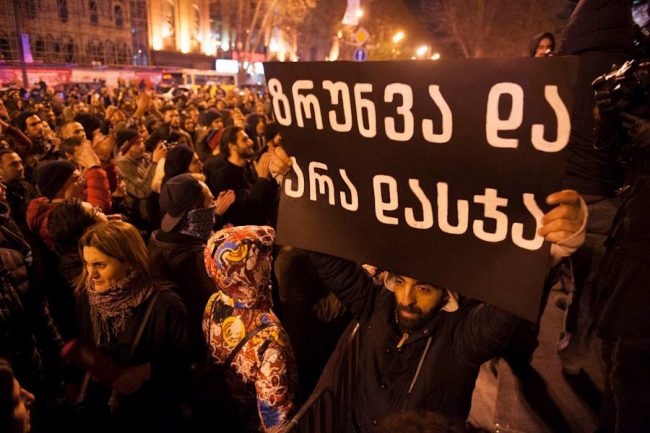
 A bill to decriminalise drug use and possession of small quantities has been put on hold, as an interagency commission has expressed support for a new government draft drug policy law. The new bill has faced backlash from activists and rights groups, who say it does not address the problems with the country’s drug policy.
A bill to decriminalise drug use and possession of small quantities has been put on hold, as an interagency commission has expressed support for a new government draft drug policy law. The new bill has faced backlash from activists and rights groups, who say it does not address the problems with the country’s drug policy.
Rights groups and five MPs from the ruling party submitted the decriminalisation bill last June, which would decriminalise possession of small quantities of all drugs for personal use.
Deputy Justice Minister Aleksandre Baramidze said on Tuesday before the hearing that the government was ‘not talking about decriminalisation, but liberalisation’.
Of the 207 illegal drugs in Georgia, the law does not differentiate quantities for 147, meaning possession of even the tiniest amounts of some substances can lead to 8–20 years or life imprisonment. The new government bill proposes differentiating quantities for only 8 additional substances.
The move was denounced by the National Drug Platform, which includes more than 40 rights groups and NGOs, as ‘the quantities they propose does not serve the interests of drug users’.
‘Nobody mentioned decriminalisation at today’s hearing, which is alarming’, Guram Imnadze, a lawyer from local rights group the Human Rights Education and Monitoring Centre (EMC) said after it was over.
He said the government bill would only prevent those caught possessing the tiniest quantities of drugs, such as the remains in a syringe, from imprisonment. He said this does not address the main problem with the country’s drug policy, that ‘people spend years in prison for drugs they intended for personal use’.
‘The bill corrects only one of the anomalies of Georgian drug policy while neglecting systematic problems and injustices. It’s unfortunate that members of the interagency committee agreed on inconsistent implementation of legal changes’, a statement issued by EMC on 28 March said.
Activist expressed disappointment at the new bill, given apparent political support for change from the top officials.
On 10 June, PM Giorgi Kvirikashvili said that drug laws in the country were too harsh and ‘liberalisation is needed’.
‘I’d like to ask parliament to speed up the workflow in order to adopt an altered, humane law corresponding to european legislation by the autumn parliamentary session’, he said.
Despite the PM’s statement of support the decriminalisation bill has been put before only one committee hearing and has not gone to a plenary hearing.
Harsh punishments
On Monday a number of media personalities led a demonstration in support of Mamuka Berdzenishvili, a former employee of the Georgian Public Broadcaster who was sentenced to 8 years behind bars on 21 March for possession of 2 grammes of MDMA.
The law considers this amount of MDMA an extra large quantity, punishable by 8–20 years or life in prison time if convicted.
‘We think quantities should be defined in the law, so that any quantity is not automatically considered a large quantity. We also think that drug users should not be going to prison and the state policy should be care-oriented, not oppressing problem drug users’, the organisers of the protest said in a statement.
Activists and rights groups have called on the PM to answer questions regarding promises he had made about drug policy reform.
On 26 March White Noise Movement, a leading group campaigning against for drug reform, addressed Giorgi Kvirikashvili saying that ‘police, law enforcement, and the justice system still comply to a zero tolerance drug policy, using inadequately harsh punishments that ruin innocent people and their families’.
[Read more about Georgia’s drug policy on OC Media: Georgia’s ‘war against the people’ and the war against a ‘system that stinks’]




 28 March 2018
28 March 2018


